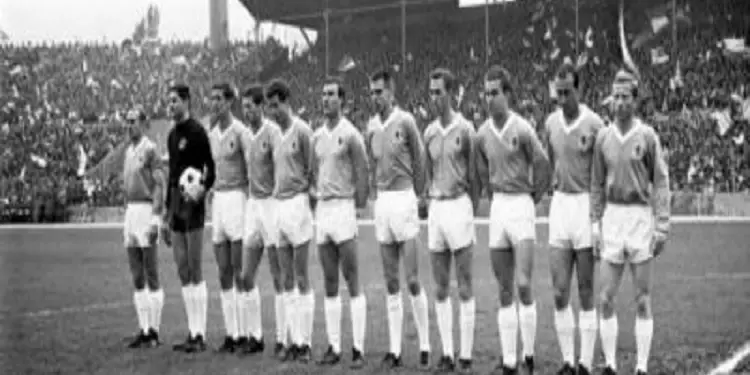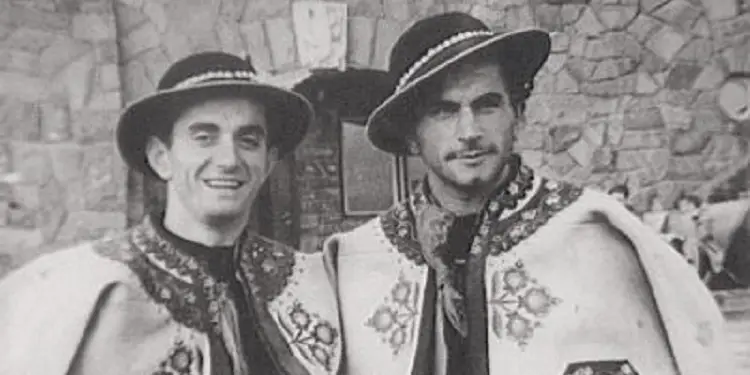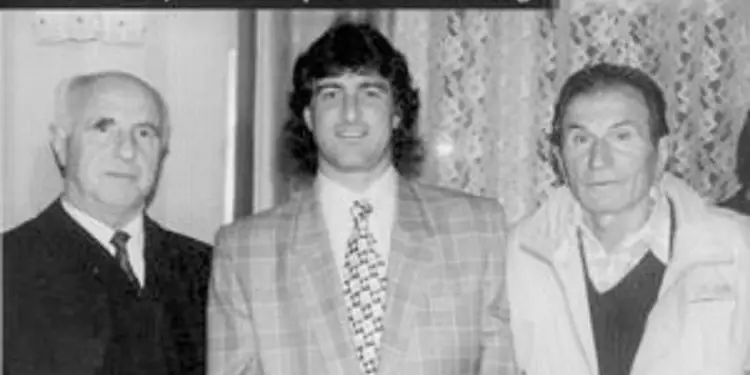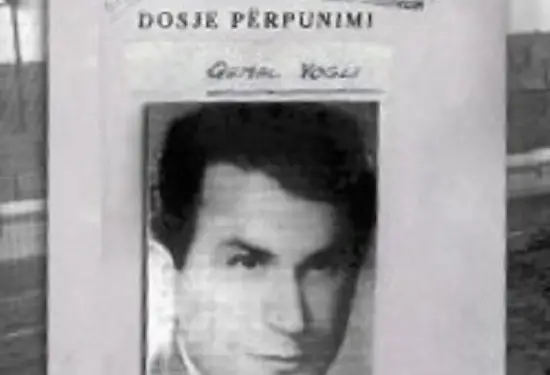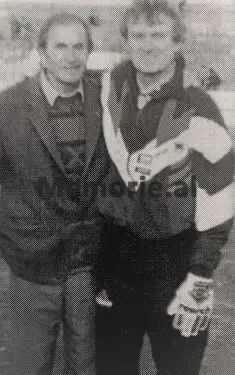From Erblin Vukaj
Memorie.al / Qemal Vogli, considered as; The “Black Cat” goal of Dinamo in the 1950s stunned the Soviets and earned the praise of goalkeeping legend Lev Yashin. But his success story, unfortunately, was short. For the first time, this series of writings will show by conveying State Security documents. Qemali was born in the ‘Zguraj’ neighborhood of Kavaja, on a controversial date between March 15 and September 29, 1929-1930. Albania at that time, which was under the reign of Ahmet Zogu. A certificate from the year ’75, archived by the State Security, says that; Qemali was born on March 15, 1929. Elsewhere, it is said that his date of birth is September 29, 1929, while in the investigator, Vogli himself, wrote that he was born in 1930.
Until adolescence, Vogli would live the most difficult history of Albania. The period of the Bird Kingdom was closed by the fascist occupation and the start of the Second World War. The Nazis took the place of the fascists. After the liberation, the communist regime of Enver Hoxha was established in Albania, which would describe the Vogli family as “with a bad biography”, for suspected links with the nationalist organization “Balli Kombëtar”, an organization that the communists connected with the Nazis.
Driven by this setting, in the first years after the liberation, the regime would imprison Qemali’s two brothers (Mahmut and Xheladin Vogli), leaving him alone with his mother, sister, sister-in-law and the two children of one of the brothers. Earlier, his father, Bakiu, and older brother, Myslimi, passed away. However, Qemali was freed from these difficulties only by football.
With his height – about 1 meter and 90 centimeters – he stood out since 1946, as the goalkeeper of the “Besa” team from Kavaja. Even though he was a teenager, his talent paved the way for him to move to the team of “Red Star” – today Teuta – in Durrës. There he caught more attention and won a place in the national team, where he made his debut on May 25, 1947 – Balkan Cup: Albania 0–4 Romania.
In Durrës, he started working as an assistant-welder in the port, a place where the State Security was full of spies, three of whom would report with the nicknames: “Goma”, “Çapkëni” and “Jehona”. They would spy on him for any behavior, since the regime called Vogli “politically tainted”. The spying would be bigger since Qemali debuted with the national team in 1947.
Report of the associate “Goma”, October 10, 1947, when Vogli was 18 years old!
“When Qemali left work, he had left the electric welding machine, with the threads meeting, and he had left the machine on the deck of the tugboat, thus putting the personnel and the tugboat at risk of burning, because of the night dew, or the wet , the entire tugboat and all the yard’s vessels could be turned on and powered.
When a sailor was about to go out on land, without measuring, throwing the current up and quickly went out and called the workers, who were in the conference, immediately the electrical technicians come and put the wires of the current. In this way, the tug was saved along with the crew that was inside. The apparatus went out of use because it burned, the tugboat was not repaired and its crew was left without a job.
Qemali has two brothers in prison, one as an “enemy of the people” and the other, because he wanted to escape to Italy. This is more associated with; Z.R., O.M., I.D”!
This case, reported by State Security associates, became a problem for Vogli. Documents show that; in exchange for exonerating him for the damages of negligence at work, Sigurimi forced him to become an informant. However, Vogli, whose brothers had been imprisoned by the regime, did not cooperate.
Part of the report-biography kept by the Chairman of the III Branch, Halim Xhelo, in 1955:
“…For all the negligence and damages, it turns out that Vogli, in 1947, was ready to be arrested, but as it seems, then it was not approved by the Directorate and he was called by the Security bodies to the construction site, to advise him, where at this time, B.P. was recruited informant.
In 1950, he was accepted as a very good athlete (goalkeeper) of the “Dinamo” team. As a player, he has performed very well; he has shown himself to be willing and courageous.
At the same time, from 1950 to 1954, he was associated as B.p. of our bodies, but in this regard, he did not give anything, because he did not want to cooperate…”!
In 1950, the communist regime of Enver Hoxha, after establishing official relations with the Soviets, established the “Dinamo” Sports Club, designed according to the Russian model of “Dinamo”, Moscow, which was under the tutelage of the Ministry of the Interior. Vogli was 20 years old and was called to “Dinamo” by the coach of that time, Ludovik Jakova. So Vogli moved to Tirana, but being separated from his family was difficult for him, because his mother was his weak point.
In the capital, the Sports Club set him up with a job in the office of the Ministry of the Interior, this rather to keep him under observation, since his family biography and the fact that his brothers were convicted did not inspire confidence in him.
However, the successes with “Dinamon” gave the Kavaja goalkeeper extremely popularity. For about 5 years, records were set and several championships were won in a row.
Probably, the popularity made the “Insurance” not to act when the reports started to come that; during his trips abroad, Vogli was carrying out smuggling, an action which, in truth, was carried out by most of the football players of “Dinamo”.
“S.P., who had heard from K.H. (P.H.’s friend, a musician in the military band), that the sportsman Qemal Vogli, who lives near K.H.’s house, when he returned once from the tour that our national team made abroad, brought contraband, a significant amount of car needles sewing machines, lighter stones, etc., which he had put in three bicycle racks, he sold them and earned about 300 thousand ALL from this smuggling”.
B.p. “Bjeshkorja”, April 10, 1954
“…he told me that he also bought some clothes and loot at home the last time, when he went abroad with some contraband, such as a wristwatch and a deck, which he took with him and earned almost 40,000 ALL “.
B.p. “Library of Pogradec”, June 8, 1955
The collaborator nicknamed “Pogradec Library” was a former prisoner for theft, who was employed in the office of the Ministry of the Interior, in 1950. There he befriended Qemali and reported on the Security, everything up to troubled family relations. .
In some of the reports, in June 1955, Sigurimi received information that; Vogli was even thinking of escaping.
“…Qemali told me: I want to kill, because in 1950, when they let us go free, I was also single, I didn’t have my mother, I didn’t decide, even when I came here, my brother told me; why did you cut your head”?!
B.p. “Library of Pogradec”, June 21, 1955
Security instructs the “Library of Pogradec” to harass him even more…!
“In the meeting you will have, don’t give a reason to open up again, to talk about escape. Try to start such a conversation from Qemal. You remained upset, relating to the bad treatment that was allegedly done to you, then you expressed your suspicion that even at work, they are not taking me. If he starts talking about escaping, try to get as many details as possible, how he tries to organize it, does he have other friends, but carefully, so as not to leave him in doubt”!
Tasks assigned to B.p. “Library of Pogradec”, by the First Captain, Hito Hitaj, June 21, 1955
Qemal Vogli escaped a year after these reports, on September 3, 1956.
The story of the football champion, who was forgotten by communism…!
In the 1950s and 1960s, goalkeeper Lev Yashin (Yashin) was the pride of Soviet football. “The hero of the working class”, he waited for the blows, did you say he had eight hands and because of the fact that he always wore black, he was called; “Black spider”.
For 20 years, he defended the goal of “Dynamo” of Moscow. In his career, he won many trophies, including Olympic medals and the European Cup, with the Soviet representative.
In world football history, Lev Jashin, declared the best goalkeeper of the 20th century, still remains unbroken, due to the fact that he is the only goalkeeper who has been awarded the “Golden Ball”.
However, in those years, in Albania, he had a peer who potentially had the opportunities to compete with him, but fate did not reserve the same success.
His name was Qemal Vogli. He, too, came “from the working class”. He also defended the goal of “Dinamo”, but of Tirana. He stood out in black clothing at the gate and from the throws he made, he got the nickname; “The black cat”.
He met Jashin in 1954, in Moscow after a friendly match between two “Dinamos”. The Soviets had heard about Vogli, since the 1951 friendly in Tirana (Albania 1-1 “Spartak” of Moscow), where Vogli was distinguished by his perfect exits and throws at the goal.
Jashin and Vogli – at that time both 25 years old – evaluated each other with consideration.
With “Dinamon”, in 6 years, Vogli would be the protagonist in the victory of 5 cups and 5 championships. Still unbroken for Albanian football, are the records: 25 consecutive victories (season 1951-’52) and only 5 goals conceded, during a championship.
But, although many were proud of his sporting achievements, Vogli did not become the “Hero” of Albanian communist football, on the contrary. Everything about Vogli was drowned in oblivion, when on September 3, 1956, he escaped to the West. He was 27 years old and had only 10 years of professional football.
Circumstances meant that, after another friendly with “Dinamo” of Berlin, he moved to West Berlin. It was a time when the wall had not yet been built. It was the time when escapes were severely punished by the dictatorial regime of Enver Hoxha.
From 1956, until today, the story of Qemal Vogli has been told among the narratives and a few documents. This series of articles will begin to tell the story of one of the most extraordinary athletes of Albanian football, referring to the file that the State Security kept on him.
The file shows that, in fact, Sigurimi had collected information on Vogli since he was a teenager.
Next to him, Sigurimi had 10 known collaborators, with the nicknames: “Chapkëni”, “Goma”, “Jehona”, “Bjeshkore”, “Biblioteka e Pogradec”, “Topi”, “Stina e Siut”, “Besuesi” and” The River”.
Vogli’s biography was presented with a family connection engaged with the “National Front”, but nevertheless, he was privileged by his sporting talents and was not penalized, not even for the smuggling he did, just like some other sportsmen, who when they went abroad, on the way back, even though it was not allowed, they took various items with them.
However, Sigurimi constantly monitored Vogli, for alerts from associates, about the tendencies to escape that he sometimes displayed. An escape that would materialize in 1956, but that did not last long.
He returned to Albania, with the version that the regime propagated: perhaps, he was caught thanks to the Sigurimi agency and the cooperation with the sister agencies of other communist countries.
In his file, all traces have been erased, but there is correspondence maintained with the STASI, the counterpart of State Security, in East Germany.
Due to the popularity he had among the people, the goalkeeper of “Dinamo” was sentenced to only 15 years in prison, later, he was amnestied and after 5 years, he was released.
However, it was no longer the same. He was forbidden to play football, while the documents show that he was kept under constant surveillance of the State Security, until 1991, often being described as; secret agent
The most severe punishment he received, probably, was being separated from his daughter when she was still small and banned from playing football for the rest of her life.
Qemal Vogli, most likely, could not win Olympic medals, the European Cup, or the Golden Ball, but it is certain that, if he had continued to play football, it would have been a much more fantastic story of Albanian football, a story that it would never be forgotten. Memorie.al




